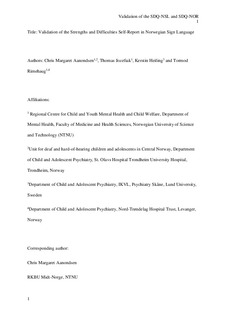Validation of the Strengths and Difficulties Self-Report in Norwegian Sign Language
Journal article, Peer reviewed
Accepted version

Åpne
Permanent lenke
http://hdl.handle.net/11250/2620220Utgivelsesdato
2019Metadata
Vis full innførselSamlinger
Sammendrag
The majority of studies on mental health in deaf and hard-of-hearing children report a higher level of mental health problems. Inconsistencies in reports of prevalence of mental health problems have been found to be related to a number of factors such as language skills, cognitive ability, heterogeneous samples as well as validity problems caused by using written measures designed for typically hearing children. This study evaluates the psychometric properties of the self-report version of the Strengths and Difficulties Questionnaire (SDQ) in Norwegian Sign Language (NSL; SDQ-NSL) and in written Norwegian (SDQ-NOR). Forty-nine DHH children completed the SDQ-NSL as well as the SDQ-NOR in randomized order while their parents completed the parent version of the SDQ-NOR and a questionnaire on hearing and language-related information. Internal consistency was examined using Dillon-Goldstein’s rho, test-retest reliability using intraclass correlations, construct validity by confirmatory factor analysis (CFA) and partial least squares structural equation modeling. Internal consistency and test-retest reliability were established as acceptable to good. CFA resulted in a best fit for the proposed five-factor model for both versions, although not all fit indices reached acceptable levels. The reliability and validity of the SDQ-NSL seem promising even though the validation was based on a small sample size. Validation of the Strengths and Difficulties Self-Report in Norwegian Sign Language